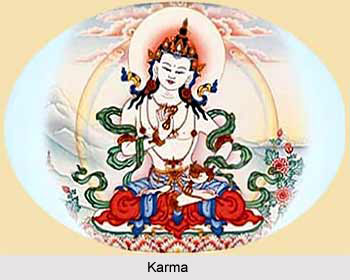 Cause of Karma is said to be the passion of individuals. The necessary requirement for coming out of Samsara is the knowledge of the causes which produce constant binding of new Karmas, and elimination of just these causes.
Cause of Karma is said to be the passion of individuals. The necessary requirement for coming out of Samsara is the knowledge of the causes which produce constant binding of new Karmas, and elimination of just these causes.
The causes of binding are:
1. Mithyatva, heterodoxy,
2. Avirati, defective Selective self-discipline, i.e. not paying heed to the precepts,
3. Kasaya, passions,
4. Yoga, activity
Each one of these causes is again divided into a large number of sub-parts; binding of Karma is, ascribed to each one of them. Now since each one of these karmas can naturally be bound only as long as the cause of its binding exists, its binding ceases the moment the cause is removed. But the causes of binding can only be removed just in a certain order and not outside the basis of this theory, the way from complete heterodoxy to redemption is divided into 14 stages ("Gunasthanas") of which the higher is constantly different from the preceding one in as much as one of the causes of binding is eliminated in it wholly or partially, and accordingly, one order of the Karmas is not any more bound again. Once the passions and all the preceding causes of binding are eliminated, the Jiva binds only the Karma "feeling of pleasure"- the only one which lets it assimilate the activity (Yoga) for itself alone; once the activity has disappeared, no more Karma is bound at all, and moksha is achieved.
This article is a stub. You can enrich by adding more information to it. Send your Write Up to content@indianetzone.com



















